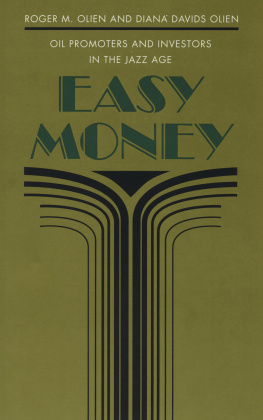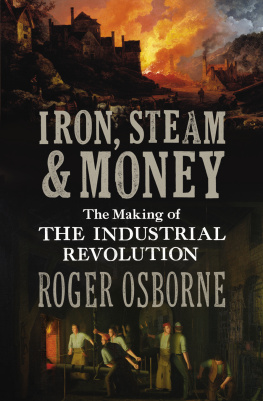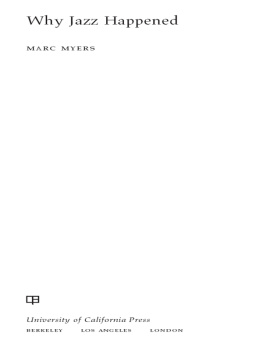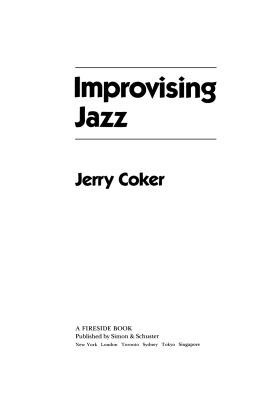1990 The University of North Carolina Press
All rights reserved
Library of Congress Cataloging-in-Publication Data
Olien, Roger M., 1938-
Easy money : oil promoters and investors in the jazz age / by
Roger M. Olien and Diana Davids Olien.
p. cm.
Includes bibliographical references.
ISBN 978-0-8078-1928-x(alk. paper)ISBN 978-0-8078-4291-1 (pbk.:
alk. paper)
1. Petroleum industry and tradeUnited StatesFinanceCorrupt
practicesHistory20th century. 2. SpeculationUnited States
History20th century. 3. FraudUnited StatesHistory20th
century. 4. United StatesEconomic conditions1918-1945.
I. Olien, Diana Davids, 1943- II. Title.
HD9565.0647 1990
364.168dc20
90-50017 CIP
The paper in this book meets the guidelines for permanence and
durability of the Committee on Production Guidelines for Book
Longevity of the Council on Library Resources.
Manufactured in the United States of America
94 93 92 91 90 5 4 3 2 1
THIS BOOK WAS DIGITALLY MANUFACTURED.
PREFACE
The Lawyers, Doctors, Hatters, Clerks
Industrious and lazy,
Have put their money all in stocks:
In fact, have gone oil crazy.
THIS DITTY, as sung in New York, Philadelphia, and all the principal cities of the Union where ile fever abounds, describes one of the great speculative manias of nineteenth-century America. Others, in land and in canal and railroad shares, preceded it, and many more would follow it.
Charles P. Kindleberger is one of the few scholars to examine speculative manias. In a pioneering work he explains what happens in booms in terms of investor irrationality Kindleberger describes mob psychology and the irrationality of the gullible and greedy over a vast expanse of European and American history. He concludes that, though they need a little help from government occasionally, capital markets work well: Modern excesses burn themselves out without damage. Manias, thus, are aberrations, unrelated to the regular conduct of business or to the general health of the economy.
We believe that this view is open to question when speculative booms and manias are viewed with greater attention to detail than Kindlebergers broad overview permitted. A number of significant topics deserve further study, including the social and economic basis of speculative booms, the expectations and mentalities they reflect, the apparent difficulty of increasing assets during booms, the relation of fraudulent business activity to manias, and the effect of law enforcement on fraudulent boom-time activity.
The literature on mining and securities speculation has addressed these subjects in piecemeal fashion. We believe that these topics can be delineated more sharply through examination of a single industry during a limited period of time. The best candidate for such scrutiny is the domestic petroleum industry during the era of World War I. The remarkable boom of this period exceeded even that of the 1860s, when the industry was young. The latter period, moreover, saw the scope of activity spread over the entire country, far beyond the financial communities of major eastern cities. The oil industry, given to volatile boom-to-bust cycles and to speculative high-risk activity, was the popular favorite of small investors during much of the postwar period. One can trace their motivations and fates most clearly in oil.
The postwar period serves a scholar interested in speculation well because it was one of the most expansive and optimistic in our history. Jazz-age Americans from all income brackets believed they could make quick riches. Widespread prosperity, accentuated by striking booms in some sectors of the economy, encouraged investors and promoters alike to assume that there was never a better time to build fortunes. They did not expect to use special resources or expertise to do so; they agreed with industrial titan John J. Raskob that anyone can be rich. Investors looked to become wealthy by buying into glamorous new ventures in such areas as real estate, oil, and communications, while promoters expected to prosper either by using investor capital or by stealing it.
The role of promoters in launching ventures in high-risk enterprises also deserves additional attention, especially with regard to their relations with investors. Again, oil is ideal as the focus of this investigation because capital formation in the independent sector of the industry has traditionally relied on promotion to fund exploratory activity. In oil, as in real estate and other businesses, promoters have raised capital for activities that are economically and socially useful. As we have shown in Wildcatters, promoters have long been a creative, vital, and constructive part of the American oil industry. During the twenties in particular, the vast expansion of domestic oil reserves was largely the accomplishment of promoters who risked their careersand other peoples money. The antics of dishonest promoters notwithstanding, promotion of high-risk ventures is legitimate and important in an open economy.
It is particularly challenging to go beyond the general outline of promotional strategies and assess how well they functioned. The main problem for scholars is the relative absence of a paper trail for small businessmen. Small independent oilmen did not normally keep voluminous records on the day-to-day details of business, and when businesses ended in ruin, there was even less incentive to preserve their records. Similarly, Americans of all income brackets received huge quantities of mail promoting investments during the teens and twenties, but remarkably little of this material has found its way to archives. Many people simply discarded such junk mail when they received it; those who responded and lost money had little reason to keep the promotional literature as souvenirs of financial misjudgment. The fullest collections of materials come from ventures that landed promoters in troublewith investors and often with the law. Thus the surviving record may produce a skewed view of promoters as a group.
Fortunately, much evidence relating to promoters is now in the care of the National Archives and its branches. We are especially indebted to Barbara Rust of the Southwest Branch (Fort Worth) and to Aloha P. South of the Civil Division in Washington for highly efficient management of our requests for materials. Our work was also aided by Anita Voorhies at the University of Texas-Permian Basin, Richard Mason and Janet Neugebauer of the Southwest Collection at Texas Tech University, Dr. Bobby Weaver of the Panhandle-Plains Museum, and the staffs of the Barker Texas History Center at the University of Texas at Austin and of the Permian Basin Petroleum Museum, Library, and Hall of Fame, Midland, Texas. Mr. Clyde Barton provided valuable help in picking up the trails of promoters in local land records, while Rose Mary Malone and Arthur G. Randall secured important material for us in Wyoming.
We have also benefited greatly from critiques and suggestions at various stages of work, notably from Forrest McDonald, J. Conrad Dunagan, Betty and Leo Byerley, and Nicholas C. Taylor. Clyde Barton, Ford Chapman, J. Conrad Dunagan, John Hendrix, Robert Leibrock, Joe B. McShane, W. D. Noel, John J. Redfern, Jr., Ed Reigle, William Thams, and Oliver Wood provided valuable encouragement for our research. Drs. Duane M. Leach and H. Warren Gardner of the University of Texas-Permian Basin also gave us welcome support for its completion. Major funding was provided by the Communities Foundation of Texas. We have had complete control of the research and writing of this book, and thus we are solely responsible for its content.










